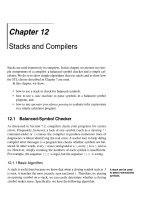programming and problem solving with c++ 6th by dale ch11
Bạn đang xem bản rút gọn của tài liệu. Xem và tải ngay bản đầy đủ của tài liệu tại đây (721.77 KB, 97 trang )
Chapter 11
Arrays
Chapter 11 Topics
●
●
●
●
Declaring and Using a One-Dimensional Array
Passing an Array as a Function Argument
Using const in Function Prototypes
Using an Array of struct or class Objects
Chapter 11 Topics
●
●
●
●
●
Using an enum Index Type for an Array
Declaring and Using a Two-Dimensional Array
Two-Dimensional Arrays as Function Parameters
Declaring a Multidimensional Array
C-Style Strings
C++ Data Types
simple
integral
enum
structured
floating
array struct union class
char short int long bool
float double long double
address
pointer
reference
Structured Data Type
A structured data type is a type
that
■
Stores a collection of individual components with one variable name
■
And allows individual components to be stored and retrieved by their
position within the collection
Declare variables to
store and total 3 blood pressures
int
int
bp1, bp2,
total;
bp3;
4000
4002
4004
bp1
bp2
bp3
cin >> bp1 >> bp2 >> bp3;
total = bp1 + bp2 + bp3;
What if you wanted to store and
total 1000 blood pressures?
int
bp[1000];
// Declares an array of 1000 int values
5000
5002
5004
5006
. . . .
bp[0]
bp[1]
bp[2]
....
bp[999]
One-Dimensional Array Definition
An array is a structured
collection of components (called
array elements):
Arrays are all of the same data
type, given a single name, and
stored in adjacent memory
locations
One Dimensional Array Definiton,
cont...
The individual components are
accessed by using the array name
together with an integral valued
index in square brackets
The index indicates the position
of the component within the
collection
Another Example
●
Declare an array called temps which
will hold up to 5 individual float
number of elements in the array
values
float
temps[5]; // Declaration allocates
Base Address
memory
7000
temps[0]
7004
temps[1]
7008
temps[2]
indexes or subscripts
7012
temps[3]
7016
temps[4]
Declaration of an Array
●
The index is also called the subscript
●
In C++, the first array element always
has subscript 0, the second array
element has subscript 1, etc.
●
The base address of an array is its
beginning address in memory
SYNTAX
DataType
ArrayName[ConstIntExpression];
Yet Another Example
●
Declare an array called name which
will hold up to 10 individual char
number of elements in the array
values
char
name[10];
Base Address
// Declaration
allocates memory
6000
6001
6002
6003
6004
name[0] name[1] name[2] name[3] name[4]
6005
6006
6007
. . . . .
6008
6009
name[9]
Assigning Values to
Individual Array Elements
float temps[5]; int m = 4; // Allocates memory
temps[2] = 98.6;
temps[3] = 101.2;
temps[0] = 99.4;
temps[m] = temps[3] / 2.0;
temps[1] = temps[3] - 1.2;
// What value is assigned?
7000
99.4
temps[0]
7004
7008
?
98.6
temps[1]
temps[2]
7012
101.2
temps[3]
7016
50.6
temps[4]
What values are assigned?
float temps[5]; // Allocates memory
int m;
for (m = 0; m < 5; m++)
{
temps[m] = 100.0 + m * 0.2 ;
}
7000
7004
7008
7012
7016
?
?
?
?
?
temps[0]
temps[1]
temps[2]
temps[3]
temps[4]
Now what values are printed?
float temps[5];
// Allocates memory
Int m;
. . . . .
for (m = 4; m >= 0; m--)
{
cout << temps[m] << endl;
}
7000
7004
7008
7012
7016
100.0
100.2
100.4
100.6
100.8
temps[1]
temps[2]
temps[3]
temps[4]
temps[0]
Variable Subscripts
float temps[5];
int m = 3;
. . . . . .
// Allocates memory
What is
What is
7000
100.0
temps[0]
7004
temps[m + 1] ?
temps[m] + 1 ?
7008
7012
7016
100.2
100.4
100.6
100.8
temps[1]
temps[2]
temps[3]
temps[4]
A Closer Look at the Compiler
float temps[5]; // Allocates memory
To the compiler, the value of the
identifier temps is the base address
of the array
We say temps is a pointer (because its
value is an address); it “points” to
7000
7004
7008
7012
7016
a memory location
100.0
100.2
100.4
temps[0]
temps[1]
temps[2]
100.6
100.8
temps[3]
temps[4]
Initializing in a Declaration
int ages[5] = { 40, 13, 20, 19, 36 };
for (int m = 0; m < 5; m++)
{
cout << ages[m];
}
6000
40
ages[0]
6002
13
ages[1]
6004
6006
20
19
ages[2]
ages[3]
6008
36
ages[4]
Passing Arrays as Arguments
●
In C++, arrays are always
passed by reference
●
Whenever an array is passed
as an argument, its base
address is sent to the called
function
In C++,
No Aggregate Array Operations
●
The only thing you can do with
an entire array as a whole
(aggregate) is to pass it as an
argument to a function
●
Exception: aggregate I/O is
permitted for C strings
(special kinds of char arrays)
Using Arrays as
Arguments to Functions
Generally, functions that work with
arrays require two items of
information:
■
The beginning memory address of the array (base address) and
■
The number of elements to process in the array
Example with Array Parameters
#include <iomanip>
#include <iostream>
void Obtain (int[], int); // Prototypes here
void FindWarmest (const int[], int , int&);
void FindAverage (const int[], int , int&);
void Print (const int[], int);
using
namespace
std;
Example continued...
int main ( )
{
// Array to hold up to 31 temperatures
int temp[31
int numDays;
int average;
int hottest;
int m;
Example continued
cout << “How many daily temperatures? ”;
cin >> numDays;
Obtain(temp, numDays);
// Call passes value of numDays and address temp
cout << numDays << “ temperatures“ << endl;
Print (temp, numDays);
Example continued...
FindAverage (temp, numDays, average);
FindWarmest (temp, numDays, hottest);
cout
<< endl << “Average was: “ << average
<< endl;
cout << “Highest was: “ << hottest << endl;
return 0;
}









